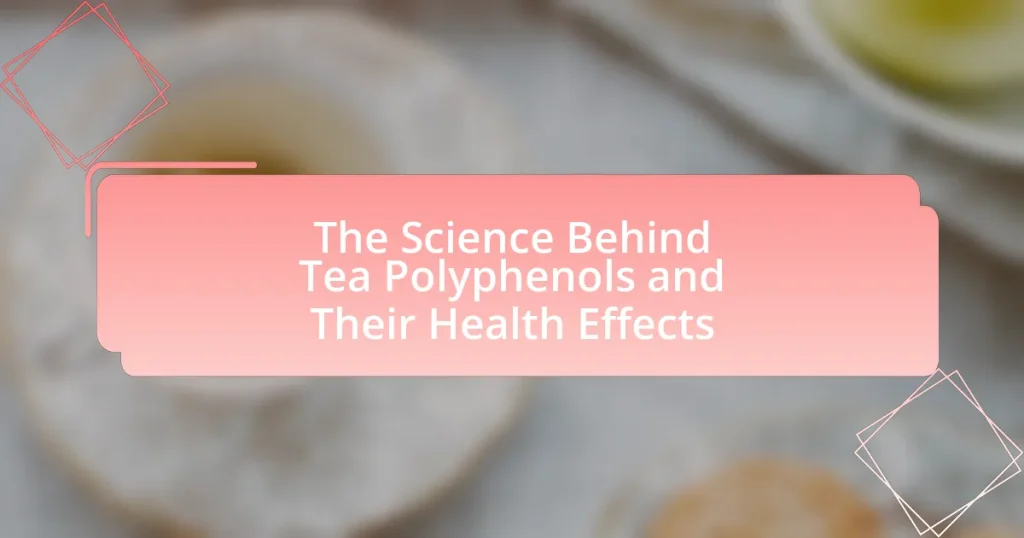Tea polyphenols are natural compounds found in tea, primarily consisting of catechins, flavonoids, and tannins, known for their antioxidant properties and health benefits. This article explores the classification of tea polyphenols, their types, and the structural differences that influence their effectiveness. It highlights the role of tea polyphenols in promoting cardiovascular and metabolic health, their mechanisms of action, and how factors such as tea type, brewing methods, and lifestyle choices can enhance their benefits. Additionally, the article discusses practical tips for incorporating tea polyphenols into the diet to maximize health effects.

What are Tea Polyphenols?
Tea polyphenols are natural compounds found in tea that possess antioxidant properties. These polyphenols, primarily catechins, flavonoids, and tannins, contribute to the health benefits associated with tea consumption, such as reducing the risk of chronic diseases. Research indicates that tea polyphenols can help lower blood pressure, improve cholesterol levels, and enhance metabolic health, supporting their role in promoting overall well-being.
How are Tea Polyphenols classified?
Tea polyphenols are classified primarily into two categories: flavonoids and non-flavonoids. Flavonoids, which include catechins, theaflavins, and thearubigins, are the most abundant and bioactive components found in tea. Non-flavonoids encompass other compounds such as phenolic acids and tannins. This classification is supported by research indicating that catechins, a subgroup of flavonoids, are responsible for many of the health benefits associated with tea consumption, including antioxidant and anti-inflammatory effects.
What are the main types of Tea Polyphenols?
The main types of tea polyphenols are flavonoids, catechins, and phenolic acids. Flavonoids are a broad class of polyphenols that include subcategories such as flavonols and flavanones, while catechins are a specific type of flavonoid predominantly found in green tea, with epigallocatechin gallate (EGCG) being the most studied for its health benefits. Phenolic acids, such as gallic acid, are also present in tea and contribute to its antioxidant properties. These classifications are supported by research indicating that catechins, particularly EGCG, exhibit significant antioxidant activity, which is linked to various health benefits, including cardiovascular health and cancer prevention.
How do the structures of Tea Polyphenols differ?
Tea polyphenols differ in their chemical structures primarily based on their subclassifications, which include flavonoids, flavonols, catechins, and tannins. Each subclass has distinct structural features; for example, catechins, such as epicatechin and epicatechin gallate, possess a flavan-3-ol backbone with varying hydroxyl groups and galloyl moieties, while flavonols, like quercetin, have a different arrangement of hydroxyl groups and a carbonyl group. The variations in these structural components influence their solubility, antioxidant capacity, and biological activity, as evidenced by studies showing that catechins exhibit stronger antioxidant properties compared to other polyphenols due to their specific hydroxyl group positioning.
What role do Tea Polyphenols play in tea?
Tea polyphenols serve as the primary bioactive compounds in tea, contributing to its antioxidant properties and potential health benefits. These polyphenols, including catechins, flavonoids, and tannins, help neutralize free radicals, thereby reducing oxidative stress in the body. Research indicates that tea polyphenols can improve cardiovascular health by enhancing endothelial function and lowering blood pressure, as demonstrated in a study published in the Journal of Nutrition, which found that regular tea consumption is associated with a reduced risk of heart disease. Additionally, tea polyphenols may support weight management and metabolic health by influencing fat oxidation and glucose metabolism, as evidenced by findings in the American Journal of Clinical Nutrition.
How do Tea Polyphenols contribute to the flavor of tea?
Tea polyphenols primarily contribute to the flavor of tea by imparting astringency, bitterness, and complexity. These compounds, including catechins and flavonoids, interact with taste receptors on the tongue, creating a range of flavor profiles. For instance, catechins are responsible for the characteristic bitterness found in green tea, while the oxidation of polyphenols in black tea leads to a richer, more robust flavor. Studies have shown that the concentration and type of polyphenols present can significantly influence the sensory attributes of tea, affecting both aroma and taste.
What is the significance of Tea Polyphenols in tea’s antioxidant properties?
Tea polyphenols are significant for tea’s antioxidant properties because they effectively neutralize free radicals, thereby reducing oxidative stress in the body. These compounds, primarily catechins, have been shown to scavenge reactive oxygen species, which can damage cells and contribute to chronic diseases. Research indicates that the antioxidant capacity of tea polyphenols is higher than that of vitamins C and E, highlighting their role in promoting health and preventing disease. For instance, a study published in the Journal of Agricultural and Food Chemistry demonstrated that green tea polyphenols significantly inhibited lipid peroxidation, a key indicator of oxidative damage.

How do Tea Polyphenols affect health?
Tea polyphenols positively affect health by providing antioxidant, anti-inflammatory, and antimicrobial properties. These compounds, primarily catechins found in green tea, have been shown to reduce the risk of chronic diseases such as cardiovascular disease and certain cancers. For instance, a meta-analysis published in the American Journal of Clinical Nutrition found that higher tea consumption is associated with a lower risk of heart disease, highlighting the protective effects of tea polyphenols on cardiovascular health. Additionally, research in the Journal of Nutritional Biochemistry indicates that tea polyphenols can enhance metabolic health by improving insulin sensitivity and aiding in weight management.
What are the potential health benefits of Tea Polyphenols?
Tea polyphenols offer several potential health benefits, including antioxidant properties, cardiovascular health improvement, and weight management support. Research indicates that tea polyphenols, particularly catechins, can scavenge free radicals, thereby reducing oxidative stress and lowering the risk of chronic diseases. A study published in the Journal of Nutrition found that regular consumption of green tea, rich in catechins, is associated with a reduced risk of heart disease due to its ability to improve lipid profiles and enhance endothelial function. Additionally, tea polyphenols may aid in weight management by increasing fat oxidation and improving metabolic rates, as evidenced by a meta-analysis in the International Journal of Obesity, which concluded that green tea extract significantly reduces body weight and body fat.
How do Tea Polyphenols influence cardiovascular health?
Tea polyphenols significantly influence cardiovascular health by improving endothelial function, reducing blood pressure, and lowering cholesterol levels. Research indicates that these compounds, particularly catechins found in green tea, enhance nitric oxide production, which promotes vasodilation and improves blood flow. A meta-analysis published in the American Journal of Clinical Nutrition found that regular consumption of tea polyphenols is associated with a 20-30% reduction in the risk of cardiovascular diseases. Additionally, tea polyphenols have been shown to decrease LDL cholesterol and triglycerides while increasing HDL cholesterol, further supporting heart health.
What impact do Tea Polyphenols have on metabolic health?
Tea polyphenols significantly improve metabolic health by enhancing insulin sensitivity and promoting fat oxidation. Research indicates that these compounds, particularly catechins found in green tea, can reduce body weight and body fat percentage. A study published in the American Journal of Clinical Nutrition demonstrated that participants consuming green tea extract experienced a 1.3 kg greater weight loss over 12 weeks compared to a placebo group, attributed to increased energy expenditure and fat oxidation. Additionally, tea polyphenols have been shown to lower blood glucose levels and improve lipid profiles, further supporting metabolic health.
What are the mechanisms through which Tea Polyphenols exert their effects?
Tea polyphenols exert their effects primarily through antioxidant activity, modulation of cell signaling pathways, and regulation of gene expression. These compounds, particularly catechins like epigallocatechin gallate (EGCG), scavenge free radicals, thereby reducing oxidative stress and preventing cellular damage. Additionally, tea polyphenols influence various signaling pathways, such as the AMP-activated protein kinase (AMPK) pathway, which plays a crucial role in energy metabolism and inflammation. Research has shown that EGCG can inhibit the activation of nuclear factor kappa B (NF-kB), a key regulator of inflammatory responses, thereby contributing to anti-inflammatory effects. Furthermore, tea polyphenols can modulate the expression of genes involved in apoptosis and cell cycle regulation, promoting cancer cell death and inhibiting tumor growth. These mechanisms collectively underscore the health benefits associated with tea polyphenols, supported by studies demonstrating their protective effects against chronic diseases such as cardiovascular disease and cancer.
How do Tea Polyphenols interact with cellular processes?
Tea polyphenols interact with cellular processes primarily through their antioxidant properties, which help to neutralize reactive oxygen species (ROS) and reduce oxidative stress within cells. This interaction promotes cellular health by protecting DNA, proteins, and lipids from oxidative damage. Research indicates that tea polyphenols, such as catechins, can modulate signaling pathways, including the mitogen-activated protein kinase (MAPK) and nuclear factor kappa B (NF-κB) pathways, which are crucial for regulating inflammation and cell survival. For instance, a study published in the Journal of Nutritional Biochemistry by Yang et al. (2018) demonstrated that epigallocatechin gallate (EGCG), a major catechin in green tea, inhibited NF-κB activation, leading to reduced inflammation in human cells. This evidence supports the role of tea polyphenols in influencing cellular processes and promoting overall health.
What role do Tea Polyphenols play in inflammation reduction?
Tea polyphenols play a significant role in inflammation reduction by modulating inflammatory pathways and inhibiting pro-inflammatory cytokines. Research indicates that compounds such as epigallocatechin gallate (EGCG), a major tea polyphenol, can suppress the expression of inflammatory markers like TNF-alpha and IL-6, thereby reducing inflammation in various tissues. A study published in the Journal of Nutritional Biochemistry demonstrated that EGCG significantly decreased inflammation in human cells by inhibiting the NF-kB signaling pathway, which is crucial for the inflammatory response. This evidence supports the effectiveness of tea polyphenols in mitigating inflammation-related conditions.

What factors influence the effectiveness of Tea Polyphenols?
The effectiveness of tea polyphenols is influenced by several factors, including their chemical structure, concentration, and the presence of other compounds. The chemical structure determines the bioavailability and antioxidant capacity of the polyphenols; for instance, catechins, a type of tea polyphenol, exhibit varying levels of effectiveness based on their specific molecular configurations. Concentration plays a crucial role, as higher doses of tea polyphenols have been shown to correlate with enhanced health benefits, such as improved cardiovascular health and reduced inflammation. Additionally, the presence of other compounds, such as caffeine and amino acids, can modulate the absorption and efficacy of tea polyphenols, impacting their overall health effects. Studies have demonstrated that the synergistic effects of these compounds can enhance the bioactivity of tea polyphenols, further supporting their health-promoting properties.
How does the type of tea affect the concentration of Tea Polyphenols?
The type of tea significantly affects the concentration of tea polyphenols, with green tea generally containing higher levels than black tea. Green tea is rich in catechins, a type of polyphenol, which can constitute up to 30-42% of its dry weight, while black tea, which undergoes oxidation, has lower catechin levels and higher theaflavins and thearubigins, resulting in a concentration of polyphenols around 10-20%. Studies, such as one published in the Journal of Agricultural and Food Chemistry, demonstrate that the processing methods and oxidation levels of different tea types directly influence their polyphenolic content, confirming that green tea retains more of these beneficial compounds compared to black tea.
What brewing methods maximize Tea Polyphenol extraction?
The brewing methods that maximize tea polyphenol extraction include using higher temperatures, longer steeping times, and specific water-to-tea ratios. Research indicates that brewing tea at temperatures between 80°C to 100°C (176°F to 212°F) significantly enhances the release of polyphenols, particularly catechins, which are abundant in green tea. Additionally, steeping tea for 5 to 10 minutes allows for optimal extraction, as demonstrated in studies showing that longer infusion times correlate with increased polyphenol concentration. Using a water-to-tea ratio of approximately 1:50 also facilitates better extraction, as evidenced by analyses of various brewing techniques.
How does the processing of tea leaves impact Tea Polyphenol levels?
The processing of tea leaves significantly impacts tea polyphenol levels by altering their chemical composition through oxidation, fermentation, and drying methods. For instance, green tea undergoes minimal oxidation, preserving higher levels of catechins, a type of tea polyphenol, compared to black tea, which is fully oxidized and has lower catechin levels but higher theaflavins and thearubigins. Research indicates that the polyphenol content can vary dramatically; for example, a study published in the Journal of Agricultural and Food Chemistry found that green tea contains approximately 30-42% catechins, while black tea contains about 3-10% catechins due to the oxidation process. Thus, the specific processing method directly influences the concentration and types of tea polyphenols present in the final product.
What lifestyle factors can enhance the benefits of Tea Polyphenols?
Regular physical activity, a balanced diet rich in fruits and vegetables, and maintaining a healthy weight can enhance the benefits of tea polyphenols. Engaging in consistent exercise has been shown to improve metabolic health, which can synergistically amplify the antioxidant effects of tea polyphenols. A diet high in fruits and vegetables provides additional antioxidants and nutrients that work in conjunction with tea polyphenols to reduce oxidative stress. Furthermore, maintaining a healthy weight can optimize the body’s response to these compounds, as obesity can diminish their efficacy. Studies indicate that individuals who combine tea consumption with these lifestyle factors experience greater cardiovascular and metabolic benefits, reinforcing the importance of a holistic approach to health.
How does diet interact with the effects of Tea Polyphenols?
Diet significantly influences the effects of tea polyphenols by altering their bioavailability and metabolism. For instance, the presence of dietary fats can enhance the absorption of certain polyphenols, while high-fiber diets may reduce their effectiveness by binding to these compounds and limiting their absorption. Research indicates that consuming tea polyphenols alongside vitamin C-rich foods can improve their antioxidant capacity, as demonstrated in studies showing increased bioactivity when polyphenols are ingested with ascorbic acid. Additionally, the overall dietary pattern, including the intake of fruits, vegetables, and whole grains, can modulate the health benefits derived from tea polyphenols, as these foods may synergistically enhance their protective effects against oxidative stress and inflammation.
What role does physical activity play in maximizing Tea Polyphenol benefits?
Physical activity enhances the benefits of tea polyphenols by improving their bioavailability and metabolic effects. Engaging in regular exercise increases blood circulation, which facilitates the absorption and distribution of polyphenols throughout the body. Studies have shown that physical activity can amplify the antioxidant effects of tea polyphenols, leading to improved cardiovascular health and reduced inflammation. For instance, research published in the Journal of Nutritional Biochemistry indicates that combining exercise with tea polyphenol intake significantly boosts the antioxidant capacity in the body, thereby maximizing their health benefits.
What are practical tips for incorporating Tea Polyphenols into your diet?
To incorporate tea polyphenols into your diet, regularly consume various types of tea, such as green, black, or oolong tea, as they are rich sources of these beneficial compounds. Drinking three to five cups of green tea daily can provide significant amounts of catechins, a type of tea polyphenol known for its antioxidant properties. Additionally, using tea as a base for smoothies or incorporating brewed tea into recipes, such as soups or marinades, can enhance your intake. Research indicates that the polyphenol content in tea can contribute to improved cardiovascular health and reduced inflammation, making these practices beneficial for overall well-being.


